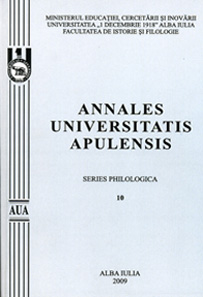An Interdisciplinary Approach to George Orwell’s Novels: Exploring Totalitarian Manipulation Techniques in ”Nineteen Eighty-Four” Through Humanistic P
An Interdisciplinary Approach to George Orwell’s Novels: Exploring Totalitarian Manipulation Techniques in ”Nineteen Eighty-Four” Through Humanistic P
Author(s): Alexandra-Florina JicSubject(s): Literary Texts
Published by: Universitatea »1 Decembrie 1918« Alba Iulia
Keywords: totalitarianism; manipulation; psychology; humanistic; Orwell
Summary/Abstract: My paper statement is that the main political message that George Orwell was deliberately trying to put forth into his main novel attacking totalitarianism, Nineteen Eighty-Four, was a warning meant to draw attention to the hidden mechanisms by which totalitarian systems come into power and maintain themselves into force, emphasizing manipulation as basic method of maintaining total control over the population, and violence only as a backup technique employed only where the former fails. Therefore the paper approaches George Orwell’s Nineteen Eighty- Four from an interdisciplinary point of view with a focus on political psychology in an attempt to make a pragmatic analysis of the inner psychological mechanisms that enabled totalitarian systems to manipulate masses in their quest for the total submission of the individual. The paper illustrates the way in which such all-embracing political systems regulate and overwhelm each sector of people’s life and it details the discussion by explaining the concealed purpose of political strategies such as keeping the population at a very low living standard, the maintenance of a perpetual state of war and the invasion of privacy. The line of research proposed in the present paper centres around one of the most important schools of thought in Psychology, i.e. Humanistic Psychology. Emerging as a reaction to Freud’s psychoanalysis and Pavlov’s behaviourism, and therefore being referred to as the “third force in Psychology”, Humanistic Psychology moved towards a more optimistic approach of human behaviour by minimizing the importance of the effects of the unconscious mind and by emphasizing both the role of personal choice and the influence of the environment in the development of an individual’s personality. What is more, the paper will particularly deal with the theory on how the human mind functions according to the level of fulfilment of one’s needs, as it was advanced by the ‘father’ of the humanistic psychology - Abraham Maslow - in his Theory of Human Motivation.
Journal: Annales Universitatis Apulensis. Series Philologica
- Issue Year: 11/2010
- Issue No: 2
- Page Range: 105-129
- Page Count: 25
- Language: English

